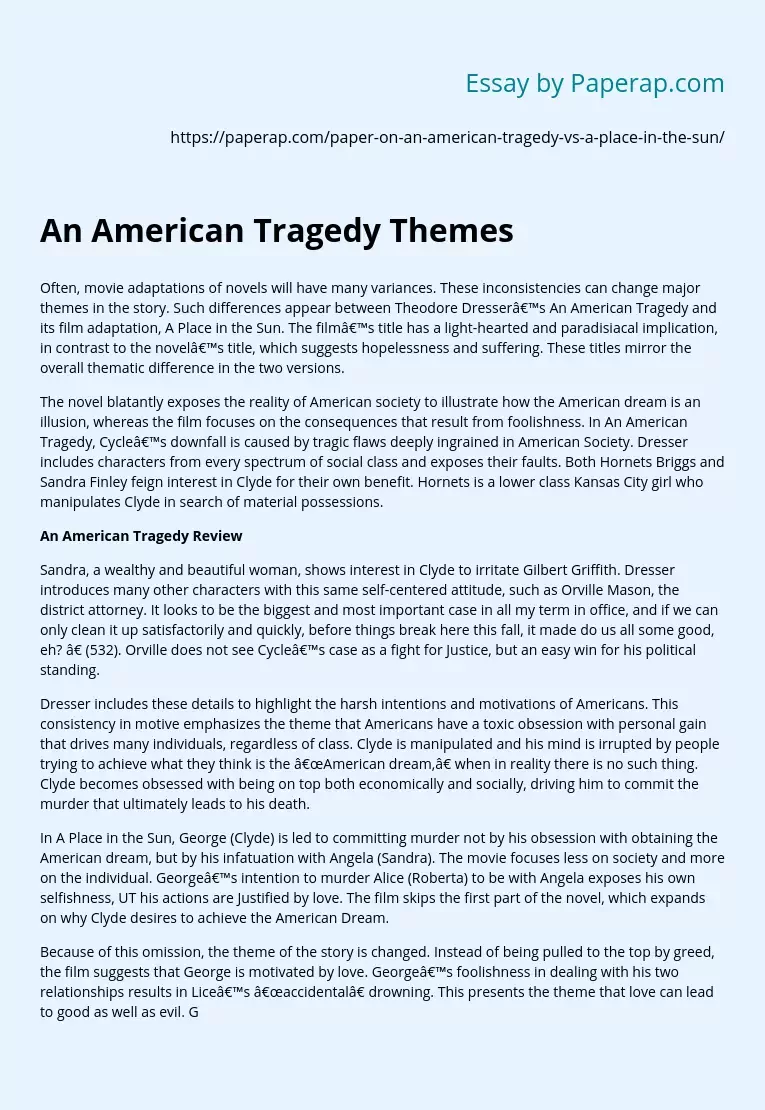An American Tragedy Themes
Often, movie adaptations of novels will have many variances. These inconsistencies can change major themes in the story. Such differences appear between Theodore Dresser’s An American Tragedy and its film adaptation, A Place in the Sun. The film’s title has a light-hearted and paradisiacal implication, in contrast to the novel’s title, which suggests hopelessness and suffering. These titles mirror the overall thematic difference in the two versions.
The novel blatantly exposes the reality of American society to illustrate how the American dream is an illusion, whereas the film focuses on the consequences that result from foolishness.
In An American Tragedy, Cycle’s downfall is caused by tragic flaws deeply ingrained in American Society. Dresser includes characters from every spectrum of social class and exposes their faults. Both Hornets Briggs and Sandra Finley feign interest in Clyde for their own benefit. Hornets is a lower class Kansas City girl who manipulates Clyde in search of material possessions.
An American Tragedy Review
Sandra, a wealthy and beautiful woman, shows interest in Clyde to irritate Gilbert Griffith.
Dresser introduces many other characters with this same self-centered attitude, such as Orville Mason, the district attorney. It looks to be the biggest and most important case in all my term in office, and if we can only clean it up satisfactorily and quickly, before things break here this fall, it made do us all some good, eh? ” (532). Orville does not see Cycle’s case as a fight for Justice, but an easy win for his political standing.
Dresser includes these details to highlight the harsh intentions and motivations of Americans. This consistency in motive emphasizes the theme that Americans have a toxic obsession with personal gain that drives many individuals, regardless of class. Clyde is manipulated and his mind is irrupted by people trying to achieve what they think is the “American dream,” when in reality there is no such thing. Clyde becomes obsessed with being on top both economically and socially, driving him to commit the murder that ultimately leads to his death.
In A Place in the Sun, George (Clyde) is led to committing murder not by his obsession with obtaining the American dream, but by his infatuation with Angela (Sandra). The movie focuses less on society and more on the individual. George’s intention to murder Alice (Roberta) to be with Angela exposes his own selfishness, UT his actions are Justified by love. The film skips the first part of the novel, which expands on why Clyde desires to achieve the American Dream.
Because of this omission, the theme of the story is changed. Instead of being pulled to the top by greed, the film suggests that George is motivated by love. George’s foolishness in dealing with his two relationships results in Lice’s “accidental” drowning. This presents the theme that love can lead to good as well as evil. George is not corrupted by society, (as in the novel), but wrapped up in a situation caused by his own, individual folly. The title of the film suggests this same theme.
George is introduced to this “place in the sun” of luxury, wealth and beautiful women, but his mistakes lead him in another direction. The differing themes between the novel and the film are the novel’s idea of the tragedy of American society and the film’s focus on individual mistakes. Dresser portrays characters as greedy and manipulative, while the film portrays them as foolishly in love. The reasons behind this inconsistency may more light-hearted because its purpose is more to entertain, while the novel may be meant to be intellectually profound.
An American Tragedy Themes. (2019, Dec 05). Retrieved from https://paperap.com/paper-on-an-american-tragedy-vs-a-place-in-the-sun/

